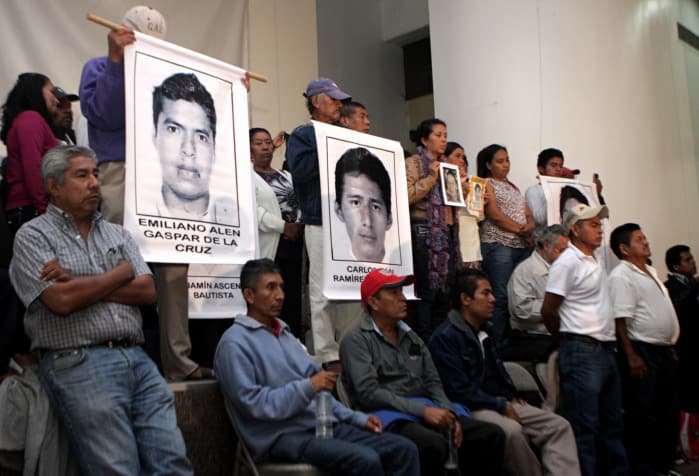Recommended: Kidnappings in Mexico surge to the highest number on record
MEXICO CITY — President Enrique Peña Nieto has pledged to redouble efforts to find 43 college students who were allegedly kidnapped by local police last month as their parents criticized the failure of the government’s efforts.
After meeting with the parents from the southern state of Guerrero Wednesday night at the presidential residence in Mexico City, Peña Nieto said in a nationally televised address that he’ll renew the search for their children and punish those responsible for their disappearance. The families held their own news conference across town an hour later, demanding results from the investigation that after five weeks has failed to determine whether the missing students are dead or alive.
The families believe the missing students are still alive, said Felipe de la Cruz, a representative of the parents. They called on international human rights officials to join the search, citing the lack of success from the Mexican government.
“We don’t trust in the government’s work,” de la Cruz said. He spoke to a dimly lit auditorium packed with journalists at a human rights center as dozens of relatives of the students stood behind him holding posters showing the faces of the missing.
“Despite all of the force of the state, we don’t have anything,” he said.
Federal officials conducting the investigation say the students were handed over by local police to a drug gang in the city of Iguala after they tried to disrupt a public event held by the wife of then-Mayor José Luis Abarca. Investigators are in the process of identifying remains from mass graves in Iguala and a nearby town, and Abarca, his wife and the police chief are fugitives and suspects in the disappearance, Attorney General Jesús Murillo said at a news conference on Oct. 28.
Excelsior newspaper reported Thursday that state authorities found another mass grave with 13 bodies in the town of Zitlala.

The case has highlighted corruption among local authorities and the weak rule of law in a country that has seen more than 70,000 deaths in drug-related violence since 2006, according to Mexico City-based newspaper Milenio. The crisis is dimming Peña Nieto’s legislative successes aimed at bolstering private-sector investment in oil, gas, telecommunications and other industries, according to political consultant Alfonso Zarate.
Peña Nieto’s meeting with the families came after nationwide protests last week and Ángel Aguirre, the governor of Guerrero State, took an indefinite leave of absence. Investigations into the disappearance of the students led federal authorities to take over security in 12 Guerrero towns last week after uncovering alleged links between local police and organized crime.
Representatives of the students and their families said they’ll stage protests in various cities nationwide on Nov. 5.
The police in Iguala, about 180 kilometers (112 miles) southwest of Mexico City, handed over the students from a local teachers college to drug gang members, who then took them to an area where mass graves were found, Murillo said Oct. 22.
Another grave was found in the nearby town of Cocula, and police from both towns have been detained in the investigation. Authorities are still in the process of determining whether the remains in any of the graves are those of the students, Murillo said on Oct. 28.
The disappearances followed protests by the students on Sept. 26 and 27 that left six people dead. Abarca took leave last month before he and his wife disappeared, and he was stripped of his immunity from prosecution last week.
With assistance from Brendan Case in Mexico City.
See also: Disappearances and drug cartels: the whispered secret of southern Mexico
© 2014, Bloomberg News





